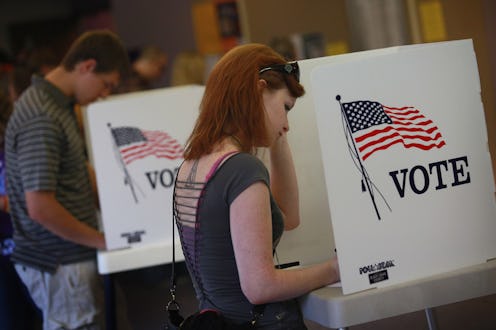News
Will Any Young Democrats Show Up For Midterms?
It's no surprise that young people don't regularly turn out for midterm elections — but voters under 30 are more apathetic than usual, according to a new poll from the Harvard Institute of Politics. Fewer than 25 percent of young Americans are sure they'll cast their ballots in the 2014 midterm elections, marking a 10 percent decline from last fall. Although the final youth-vote tally won't be certain until the polls close Nov. 4, pundits say this may be the lowest youth-voter turnout in the last 10 years.
So, will the youth vote have any effect on the 2014 midterm election? It might, considering the ideology of the voting bloc. According to the poll, young Republicans are feeling way more enthusiastic about the upcoming Congressional races than their Democratic peers. Out of those who voted for Mitt Romney in 2012, 44 percent say they'll definitely vote in the upcoming midterms. On the flip side, only 35 percent of Obama voters said they will.
It's a surprise twist, considering young people made up the bulk of Obama's road-to-the-White-House narrative. According to the Pew Research Center, 66 percent of voters under the age of 30 voted for Obama in 2008 — the largest age disparity in an election since exit polling began in 1972. Obama again won the youth vote in 2012. However, the poll points out that Obama is swiftly losing trust from his younger followers.
Young people, especially women, have long been courted by the Democratic Party, and in recent years, Democratic politicians have been winning their votes by pretty sizable margins. Many pundits stated that young women carried Obama to the White House for his second term, as unmarried women backed the president by a 38-percent margin over Romney. That year, voters also sent a record number of women politicians to Congress, many of whom beat sexism-spewing candidates like Todd "Legitimate Rape" Akin.
It'll be interesting to see, then, if female Democratic politicians can continue to make strides or defend their seats in the 2014 midterms. According to the Harvard poll, young men are more likely to vote this November than young women, which means women may need to step up in the upcoming months if they want more progress in Congress.
Only 23 percent of voters between the ages of 18 and 29 showed up to the polls during the 2010 midterm elections, a slight drop from 25 percent in 2006. However, the Harvard report found that young voters were more interested in politics in 2010, with 31 percent saying they were "definitely" going to vote in the midterms. If history is any indication, then polling places shouldn't expect to see many 20-somethings this November.
There is one bright spot from the report, though it won't be seen until 2016: Hillary Clinton already has a big lead among millennial voters, holding a "favorable rating" of 52 percent.
Image: Harvard Institute Of Politics
